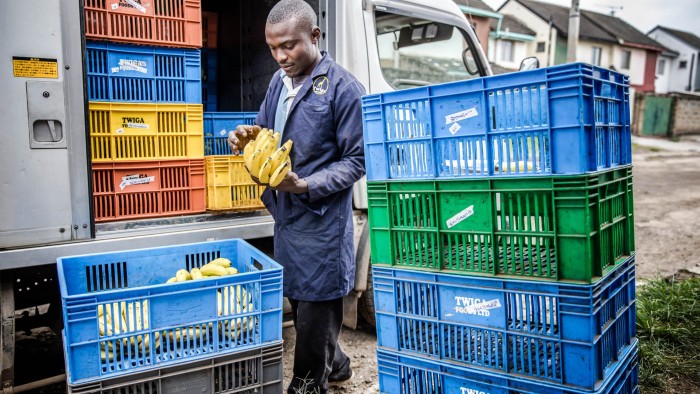Global meets local as multinationals pair with start-ups

Roula Khalaf, Editor of the FT, selects her favourite stories in this weekly newsletter.
Multinationals that want to remain innovative often grapple with how best to use their global reach to partner with start-ups. Barclays bank has had corporate accelerators in financial centres such as London and New York but also in locations including Tel Aviv and Cape Town, and carmaker BMW recently extended its Startup Garage to China. Yet while there is a growing interest in tapping innovation, accomplishing it is not easy.
In my research with more than 250 corporate executives, start-up entrepreneurs, government officials and other experts in Africa, Asia-Pacific, Europe and North America, I have observed three strategies, representing progressively greater challenge and sophistication, that help large companies partner effectively with local start-ups.
First: think global, act local. A global approach must take into account local differences in entrepreneurial ecosystems. For example, non-US companies may look to Silicon Valley for inspiration, and in some cases, such as German software company SAP, drive start-up engagement out of places such as Palo Alto. This requires understanding of the characteristics of the local context, such as its egalitarian culture.
Some tweaking may be required when companies from advanced economies take their start-up practices to emerging economies. For instance, adjustments may be needed in the length of a corporate accelerator programme (say, extending it from four to six months) and providing extra support to compensate for a lack of technical skills.
In other cases, greater change may be needed. When US retailer Walmart launched Omega 8, an initiative developing partnerships with start-ups in China, it had to adapt to the faster pace of Chinese start-ups, and their wariness of working with a lumbering giant. By imposing a time limit — 60 days on a pilot project and no more than one pilot per start-up at a given point — the company sought to align its approach.
Second: think local, act global. In addition to top-down local adaptation of practices, companies can benefit from bottom-up approaches that are then adopted globally. Tech company Microsoft’s global accelerator programme, for instance, has its origins in its research and development subsidiary in Israel, a hotbed of start-up partnering. This led to similar accelerators being set up in Asia-Pacific, Europe and North America, with the team in Israel providing the bulk of the global leadership for this.
Zack Weisfeld, who led that team, is now providing similar impetus for start-up engagement at chipmaker Intel through Ignite, a partnering programme launched in Israel which the company plans to expand to Munich and Texas. Subsidiaries in emerging markets may take a leading role in their companies’ global start-up engagement. Zurich-based Swiss Re, the reinsurance company, launched its first global insuretech accelerator programme in Bangalore.

The key ingredients for an effective think-local-act-global strategy are the proactive efforts of entrepreneurial, empowered leaders in subsidiaries combined with humility in the global headquarters, born out of a recognition that those in central management do not have all the answers.
Third: think global, act global. When companies pursue the above strategies in tandem, they can elevate start-up partnering by connecting the dots globally. This does not imply that a company should be active in every geographical location, which may simply be too resource-intensive.
But companies should deploy a judicious mix of top-down (think-global-act-local) and bottom-up (think-local-act-global) strategies in a holistic approach to shape the global footprint of their start-up partnering. This calls for a nuanced understanding of locations around the world.
For instance, a portfolio of locations might be based on the distinction between advanced and emerging economies on one hand, and hotspots in a country versus non-hotspots on the other. This approach draws attention to locations that could be easily overlooked but may have much to offer.
One illustration is collaboration between companies and start-ups in non-hotspots such as Glasgow in Scotland and Ningbo in China. Globally savvy tech group IBM, which has subsidiaries in both places, was able to benefit from a common feature: the involvement of entrepreneurial local policymakers who helped connect corporates and start-ups for joint innovation that would otherwise have been missed.
A global approach to start-up partnering is not for everyone. But a global mindset that explores locations off the beaten track may be the next frontier for global corporate innovation and offer the potential of positive societal impact.
On a research trip to Nairobi, Kenya, I became aware of how companies such as Microsoft, through its 4Afrika initiative, are linking up with ventures such as Twiga Foods, a mobile-based food distribution platform, that are not only tech-savvy but also socially minded. They are working to fill what Professor Tarun Khanna of Harvard Business School calls “institutional voids”, where there are no intermediaries to facilitate market transactions.
Such efforts transcend the narrow pursuit of profit and offer the prospect of helping to achieve the UN’s Sustainable Development Goals. Done well, start-up partnering on a global basis could become a force for good.
Shameen Prashantham is associate dean (MBA) and professor of international business and strategy at China Europe International Business School (Ceibs) in Shanghai
Comments